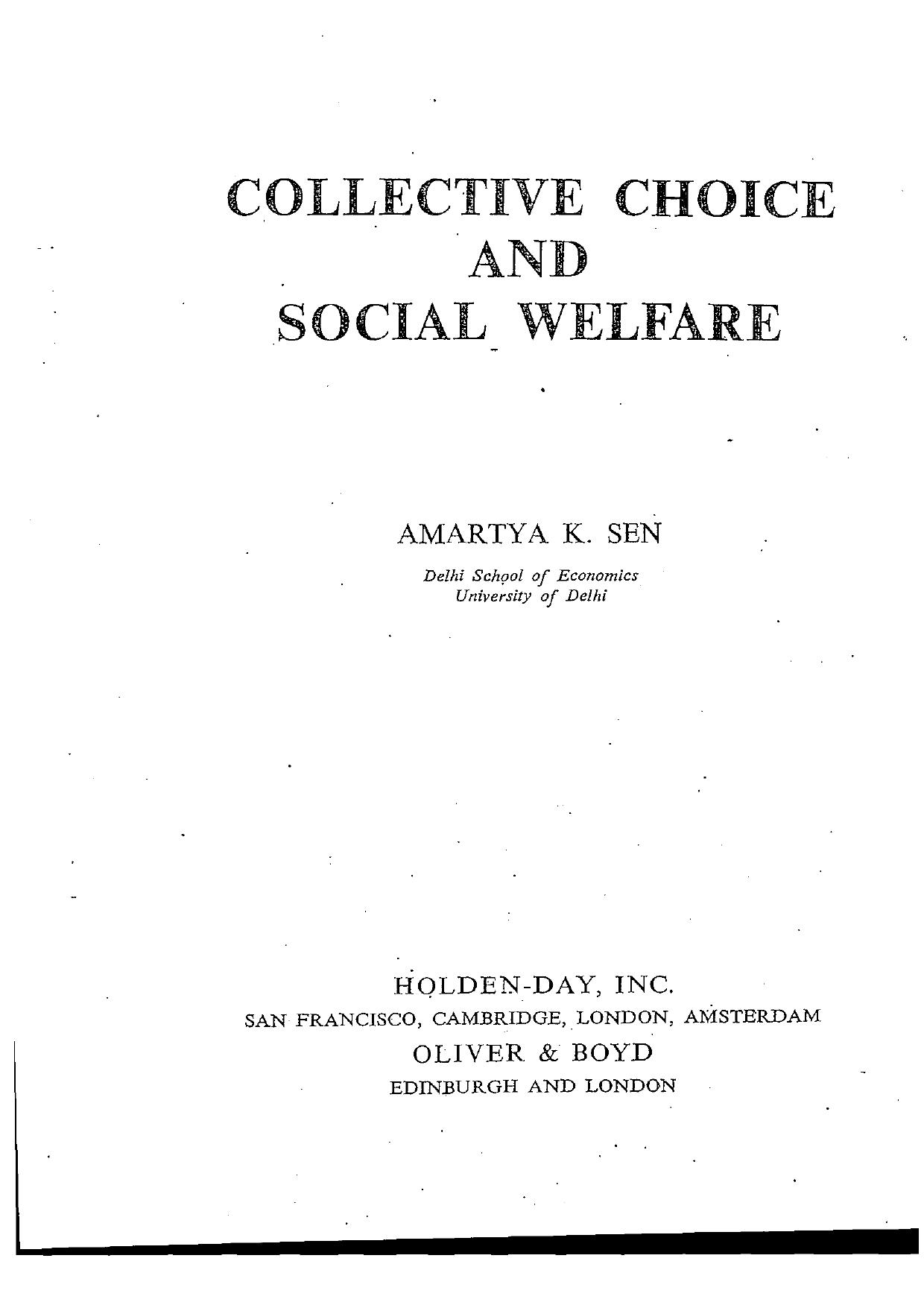Collective Choice and Social Welfare by Amartya Sen

Author:Amartya Sen
Language: eng
Format: epub, pdf
ISBN: 9780241244609
Publisher: Penguin Books Ltd
Published: 2017-01-05T16:00:00+00:00
THE IDEA OF INTERNAL CONSISTENCY OF CHOICE
The fact that we do not need to assume any internal consistency of choice to establish Arrow’s impossibility theorem is analytically interesting and important, but it does not tell us much about whether the idea of internal consistency is actually a plausible way of thinking about reasoned individual behaviour, or about reasonable social choice. That proposed approach to reasoned choice deserves a serious examination on its own.
The idea of internal consistencies of choice was powerfully introduced by Paul Samuelson (1938) in the context of demand theory in economics in a justly famous foundational contribution, initiating a major field of enquiry called ‘revealed preference theory’. The approach can be interpreted in several different ways. One interpretation that has received much attention in the subsequent literature (and has had a profound impact on the direction of mainstream economic research) is the programme of developing a theory of behaviour ‘freed from any vestigial traces of the utility concept’ (Samuelson (1938), p. 71). While this was not in line with the works of the most powerful demand theorists preceding Samuelson, its stalwarts soon became convinced that he was basically right. Even John Hicks, the author of the classic book on micro-economic theory, Value and Capital (Hicks (1939b)), who had earlier argued for the priority of the concept of preference or utility, became persuaded by the alleged superiority of the new approach, and warmly endorsed the study of human beings ‘only as entities having certain patterns of market behaviour; it makes no claim, no pretence, to be able to see inside their heads’.i
In the same spirit, Ian Little (1949a) gave his stamp of methodological approval to this approach: ‘the new [Samuelson’s revealed preference] formulation is scientifically more respectable [since] if an individual’s behaviour is consistent, then it must be possible to explain that behaviour without reference to anything other than behaviour’.ii Really? But why? A behaviour can result from many different kinds of alternative motivations, and it is not in the least clear how the need for thinking about the motivation behind any behaviour can be avoided if we try to understand the nature of a choice.
The problems with the idea and use of conditions of internal consistency of choice can be seen at two rather different levels: foundational and practical. At the foundational level, the basic difficulty arises from the implicit presumption underlying that approach: that acts of choice are, on their own, like statements which can contradict, or be consistent with, each other. That diagnosis is deeply problematic.
Statements A and not-A are contradictory in a way that choosing x alone from {x, y} and y alone from {x, y, z} cannot be. If the pair of choice acts were to entail, respectively, the statements (1) x is a better alternative than y, and (2) y is a better alternative than x, then of course there would be a contradiction here (since ‘being better than’ is an anti-symmetric relation). But those choices do not in themselves entail any such statements (until some motivational presumptions are made).
Download
Collective Choice and Social Welfare by Amartya Sen.pdf
This site does not store any files on its server. We only index and link to content provided by other sites. Please contact the content providers to delete copyright contents if any and email us, we'll remove relevant links or contents immediately.
The Secret History by Donna Tartt(19088)
The Social Justice Warrior Handbook by Lisa De Pasquale(12190)
Thirteen Reasons Why by Jay Asher(8909)
This Is How You Lose Her by Junot Diaz(6886)
Weapons of Math Destruction by Cathy O'Neil(6279)
Zero to One by Peter Thiel(5801)
Beartown by Fredrik Backman(5754)
The Myth of the Strong Leader by Archie Brown(5507)
The Fire Next Time by James Baldwin(5444)
How Democracies Die by Steven Levitsky & Daniel Ziblatt(5218)
Promise Me, Dad by Joe Biden(5153)
Stone's Rules by Roger Stone(5087)
A Higher Loyalty: Truth, Lies, and Leadership by James Comey(4962)
100 Deadly Skills by Clint Emerson(4925)
Rise and Kill First by Ronen Bergman(4788)
Secrecy World by Jake Bernstein(4753)
The David Icke Guide to the Global Conspiracy (and how to end it) by David Icke(4717)
The Farm by Tom Rob Smith(4507)
The Doomsday Machine by Daniel Ellsberg(4490)
